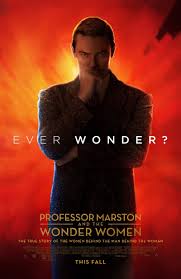 All I knew going into Professor Marston & The Wonder Women was that it was an R-rated drama about the American psychologist who created the Wonder Woman comic book character. It is that – and a whole lot more. Two things are guaranteed: if you see this film, you’ll never look at Wonder Woman quite the same way ever again; and, two, this film is definitely not for kids. Think of it as Fifty Shades meets the TV series Big Love with a bit of Sister Wives thrown into the mix… in the 1930s and ‘40s. The result is a ménage à trois situation that is surprisingly engaging and discussion-provoking and totally off the charts.
All I knew going into Professor Marston & The Wonder Women was that it was an R-rated drama about the American psychologist who created the Wonder Woman comic book character. It is that – and a whole lot more. Two things are guaranteed: if you see this film, you’ll never look at Wonder Woman quite the same way ever again; and, two, this film is definitely not for kids. Think of it as Fifty Shades meets the TV series Big Love with a bit of Sister Wives thrown into the mix… in the 1930s and ‘40s. The result is a ménage à trois situation that is surprisingly engaging and discussion-provoking and totally off the charts.
Professor Marston & The Wonder Women is based on the true story of what inspired polyamorous Harvard psychologist William Moulton Marston to create the iconic Wonder Woman character in the 1940s. His muses: his wife, Elizabeth Marston, and their lover Olive Byrne. The trio had several kids between ’em and lived together in an open relationship that was both unconventional and seemingly romantic. It could have come off really icky, but the leads generated enough chemistry to somehow make it okay: Luke Evans (Gaston, Beauty and the Beast) as Dr. Marston; Rebecca Hall (Christine) as Elizabeth; and Bella Heathcote (Leila, Fifty Shades – go figure!) as Olive, a grad student who helped the married academics study human behavior and create a lie detector machine. (The machine comes in rather handy when exploring their feelings for each other.) 
It’s impossible to know what really went on behind closed doors in the Marston-Byrne household. A friend of the Marston family recently wrote an article in Psychology Today taking exception to the amount of creative license that writer/director Angela Robinson may have taken in this unconventional biopic. Robinson’s interpretation of events allows for an exploration of how and why themes of bondage, domination, submission, feminism and female empowerment informed Marston’s creation. The film is set against the backdrop of Marston being called before censors to explain and defend some controversial imagery and themes depicted in his popular comics. His Wonder Woman isn’t the same Wonder Woman we came to know in later years (Marston died of cancer in 1947). But this is one superhero origin story that defies all expectation and convention. I’m still processing it.

